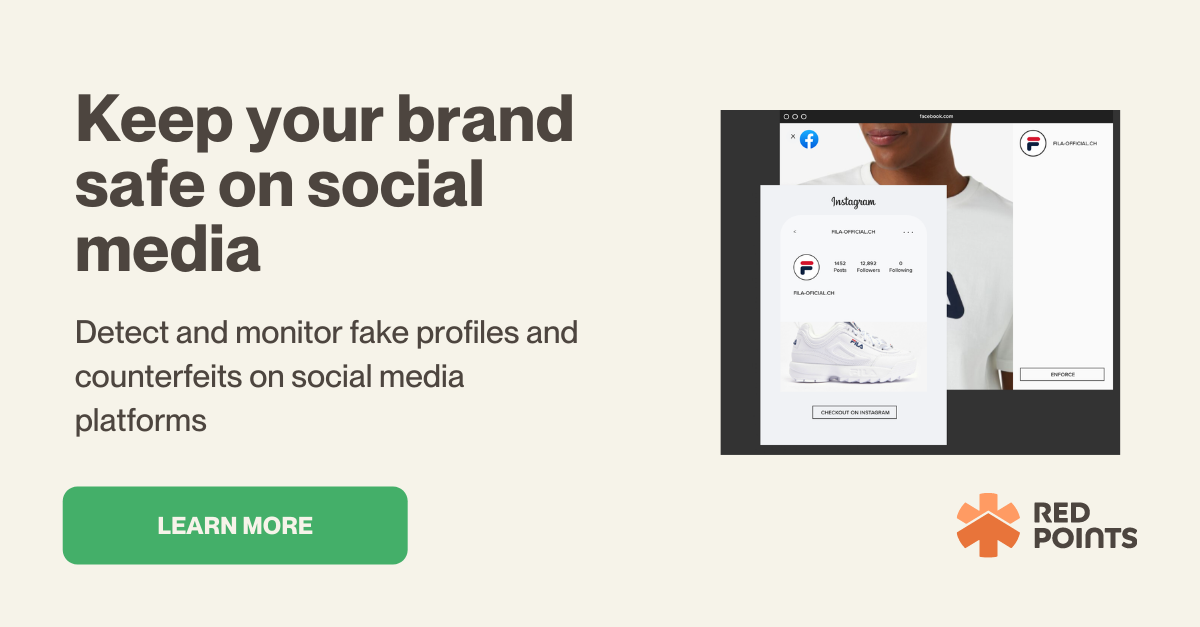Infringers have never been more active on social media platforms than today. In 2021, US consumers lost $770 million to social media scams which is an 18-time increase from 2017. Facebook and Instagram are the platforms where most social media scams took place according to a new report from the Federal Trade Commission.
In this article, we introduce the most common attacks brands encounter on Facebook. We will then show you how to protect your Facebook business page from impersonators and counterfeiters. You will learn how to efficiently monitor and enforce your IP rights on social media.
Summary:
- Understand how impersonators and scammers try to attack you on Facebook.
- Learn how to secure access to your Facebook business page.
- Get a full picture of the most trusted ways to monitor and enforce your IP rights.
Common threats for brands on Facebook
E-commerce business owners face many risks on Facebook that cause loss of revenue, brand reputation damages and stolen customer data. These are the most common threats for Facebook business page owners:
Fake reviews
Contrary to legitimate negative customer reviews, fake reviews on Facebook are only intended to harm your business. They either come from a competitor who wants to damage your brand reputation or from a vicious third party. Reviews act as free advertising for your business and improve customer trust or, when fake, completely discredit your brand.
It can be hard to tell whether a negative review is fake or not. The following marks should help you identify a fake review:
- The reviewer’s profile seems suspicious (e.g. generic name or just random numbers/letters; no profile picture; dubious posts)
- The review is overly negative, short, generic and lacks details
- The reviewer posts the same negative review on other products of your brand and/or on other online platforms
Scam ads
Scammers use a variety of techniques to perform ad scams to trick consumers on Facebook. These fake ads impersonate a legitimate brand by copying its intellectual property to make consumers believe they are buying from the real brand. When clicking on the ad, customers are linked to a fake website that either sells a fake product or simply charges for purchase and never sends a product.
Another malicious technique used by ad scammers is to hack into a brand’s Facebook business page to post their ads through the original account. During the hacker attack, scammers steal the brand’s credit card data to pay for the ads which can cause huge financial losses for the brand.
Fake profiles
Another big problem for business owners are impersonators who steal the identity of a brand to create a fake Facebook business page to profit from it. Facebook does not check whether a business page is authentic or fake. This opens the door for bad actors that impersonate your brand. It also means that business owners are left with the responsibility to find out if there are fake profiles that impersonate your business on Facebook.
Impersonators that create fake profiles with the identity of another business often sell counterfeit products pretending to be the real brand. It can be difficult for customers to identify a fake business page. When customers unknowingly buy a counterfeit product, they often falsy blame the real brand which often causes reputation damages and sales losses for the brand.
Counterfeit goods
While we have mentioned that scam ads and fake profiles are also utilized to sell counterfeits, they are not the only sources of fake products.
Facebook groups
Counterfeits are often sold in Facebook groups, sometimes specifically labeled as selling groups. These groups can be opened by anyone and are therefore difficult to monitor by a single person. Public groups can be joined by anyone whereas private groups request permission to access.
Facebook Marketplace
Facebook Marketplace has been frequently used by scammers to sell counterfeits. The service was intended to create a marketplace where Facebook members easily can buy and sell. However, the low level of both regulation and entry requirements have widely attracted counterfeiters. A common tactic for counterfeit sellers is to offer authentic products at a discount price but deliver a fake product.
How to protect your brand on Facebook
Register your intellectual property
Registering your IP is recommended for any kind of brand protection as it gives you legal protection in case of brand abuses. It also protects your business presence on Facebook as formal registration certifies you as the owner of your copyrights, trademarks, and patents. Without registration, anyone is free to use your brand or product name, logo or other brand-defining features.
Copyright doesn’t need formal registration as it comes naturally with the creation of a work. However, having your copyrights registered, gives you additional legal protection and makes enforcement easier. Trademarks make your brand distinguishable from competitors and protect your brand name, logo, slogans and other features. Trademarks need to be formally registered to be effective.
Report IP infringements to Facebook
Facebook is aware of the IP infringement problem and has continuously expanded its in-house IP team over the years that helps to takedown IP infringements. You can report IP violations directly to Facebook via publicly available reporting forms.
On our Red Points blog, we provide detailed step-by-step guides on how to report copyright infringement, fake profiles, and counterfeit sellers on Facebook.
Secure access to your Facebook business page
There are a few preventive measures you can take that make it difficult for bad actors to get access to your business page and steal sensitive information.
Choose a strong password
Many people still choose passwords that are easy to hack or sometimes even easy to guess. To keep your social media accounts safe, you need long complex passwords. Instead of creating, renewing and remembering those passwords by hand, it is helpful to use a password generator.
Additionally, a password manager like LastPass allows you to securely share login credentials between multiple users. This comes in handy when different members of your team need access to your Facebook business page. With a password manager, all you need to remember is the master password and multifactor authentification methods that you might have in place.
Third-party apps
These apps store personal data when logging into them with your Facebook credentials. It might be convenient to use this method as you don’t need to remember several passwords, however, third-party apps pose a security breach. Therefore, you should carefully assess third-party apps before connecting them to your brand or avoid using them at all.
Page rolls
Facebook business pages usually have more than one admin. This has advantages and disadvantages. On the one hand, having multiple admins ensures that other team members have access to your business page in case one account gets hacked. On the other hand, this can be a security breach when losing sight of who has access to your page.
For this reason, you should limit access to those who need to perform tasks like posting or sending messages.
Monitor and enforce your IP rights
We know now what measures you can install to protect your brand on Facebook. However, even if you execute the outlined steps, your work to protect your business page is most likely not over. Too vast is the number of infringers and their malicious techniques trying to exploit brands and consumers on social media.
Most of the threats we outlined in the first section of this article involve intellectual property infringements. Thus, you should focus on monitoring and enforcing your IP rights on Facebook and other social media platforms. If this seems daunting to you, don’t worry. There are specialized companies like Red Points that help you find and remove IP infringement on a large scale.
Red Points has helped more than 1000 clients to protect their brands from social media infringements and counterfeiters. Our social media protection service detects potential infringements on various platforms and claims takedowns automatically. You will get detailed performance reviews that display the impact of your brand protection measures.
What’s next
Protecting your brand on Facebook requires efficient solutions that can conquer impersonators, ad scams and counterfeiters. These are the main points we have discussed:
- Facebook has low hurdles for fake profiles and selling groups that disseminate counterfeits.
- It is your responsibility to protect your Facebook business page.
- Monitoring and enforcing your IP efficiently is key for protecting your brand on social media.
Contact us today to learn more about how our social media solution can help strengthen your brand reputation, keep your customers happy and recover your revenues.







